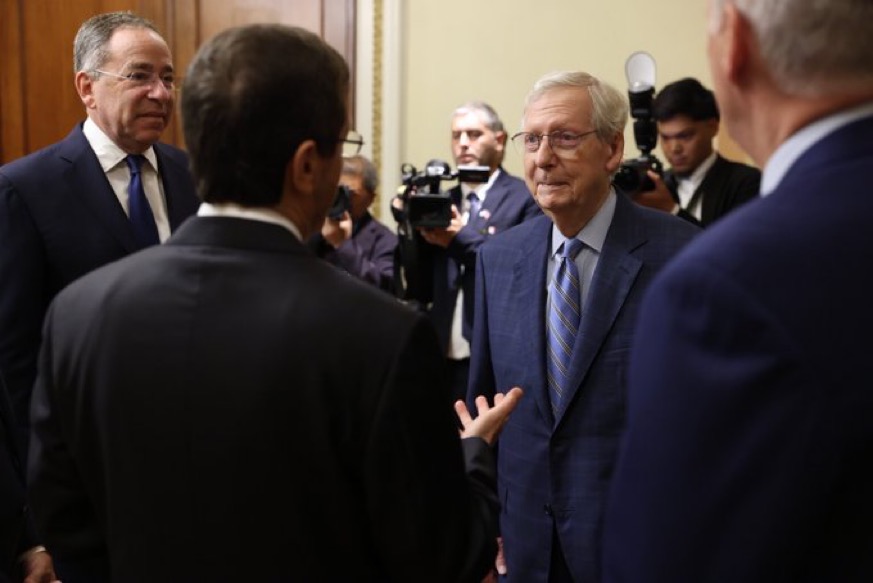Our elected officials serving in the United States Congress do not represent us. This issue has only been getting worse over time. In 1981, when Ronald Reagan was inaugurated, the average age of a congressman in the House of Representatives was 48, and the average age of a member of the Senate was 52. Today, in 2023, the average age of the House is 58, and for the Senate, 65. The 118th U.S. Congress, which began in January of this year, is the third-oldest since 1789. For most Americans, the age of 65 is usually a time where one begins to settle down and prepare for retirement. But when you’re a politician in Washington, D.C., you get to play by different rules.
Mitch McConnell, the current minority leader of the U.S. Senate, a Republican, had two significant health episodes this summer that put into question his ability to serve out the rest of his term. In late July of this summer, McConnell abruptly stopped talking mid-sentence while making opening remarks about an annual defense policy bill. After almost 20 seconds of silence, he was escorted away from the press by Senator John Barrasso of Wyoming. When McConnell came back to meet the press a few minutes later, he simply said he was “fine,” and an aide said that the senator felt “lightheaded.” It would be within reason to assume that this health episode was a fluke and that McConnell and his aide were correct in saying that he was physically well. That is, until McConnell had another episode of speechlessness at an event in his home state of Kentucky on Aug. 30. Like the first time in July, McConnell appeared to freeze for an extended period of time as he was asked a question from the press. He was, again, escorted away from the press by an aide.
After both of these incidents, McConnell made a statement when he returned to the Senate in Washington, D.C., saying, “One particular moment of my time back home has received its fair share of attention, but I assure you that August was a busy and productive month for me.” His senate office also released a statement from his physician saying that there was no evidence that McConnell experienced a stroke, Parkinson’s or any other kind of movement disorder. Regardless of what his physician says, many of the senator’s colleagues still have concerns about his health, and the American people have a right to be too. But regardless of whatever ailment McConnell has or potentially has, his health episodes this summer are a symptom of a larger problem.
The average American is 38 years old. As mentioned in the beginning of this article, the average age of the current U.S. Congress is more than 20 years older. How can Americans, particularly as millennials and Gen Z become the majority of the electorate later this decade, expect their elected officials to be in touch with their needs when they come from a completely different generation? Particularly in regards to critical issues like climate change or economic inequality, Gen Z and millennials certainly have more to lose than the silent generation, which the 81-year-old McConnell is a part of. So what is the solution to this generational divide between our politicians and the American people? Term limits.
In the way Congress is currently set up, members of the House have two-year terms and can run for reelection for as many years as they want to. For the Senate, the rules are the same, but the term length is six years, not two. I believe that term limits on members of both the Senate and the House would significantly curtail the issue of older politicians serving way past their prime, such as McConnell, or other senators such as California’s 90-year-old Dianne Feinstein. The term limits could potentially be four years, with a limit of two terms, which would be the same as the office of the presidency. But that’s not all. More provisions could be added, such as a maximum age limit for elected officials, which polls say over 75% of Americans would support. It could also potentially be one of the few initiatives that enjoy bipartisan support, as 76% of Democrats and 79% of Republicans would approve of maximum age limits for elected officials. Passing a law that includes term and age limits for Congress would help incentivize more young people to run for office and get millennials and Gen Z more politically involved. Part of the reason young people don’t vote is because they feel that voting doesn’t change anything, that out-of-touch politicians don’t care about them or, arguably most importantly, that politicians don’t represent them. It is easy to understand why they feel that way when the senators and representatives that make up Congress are decades older and millions of dollars wealthier than they are. And so, even when turnout among young voters for the 2022 midterms was the second highest in 30 years, still only 27% of voters aged 18-29 cast a ballot in the election. Those are abysmal numbers. To get higher youth turnout in our national elections, our politicians should also reflect the youth of the voters that help get them elected.
Age concerns about elected officials are not just focused on those serving in Congress, but are also fixed on the two biggest candidates in the 2024 presidential election, President Joe Biden and former President Donald Trump. Over 77% of U.S. adults think Biden, who is 80 and will turn 81 this November, is “too old to effectively serve four more years.” This view is shared across party lines. For Democrats and independent voters who are desperately looking to prevent former President Donald Trump from entering the White House again, Biden’s age could potentially be the factor that causes him to lose the 2024 election. If age limits for the office of the presidency were put in place, America would not be in the precarious position of having to choose between two elderly, unpopular candidates. But here we are.
Americans have a right to have elected officials who are ready and capable of fulfilling their legislative and executive duties throughout their time in office. But without term and age limits, politicians such as McConnell and Feinstein will continue to feel free to be in office as long as they want, even if their health and age begin to show signs that they should retire. Wanting our politicians to be young enough to understand our social and political needs isn’t ageism or ableism. It’s simply a reasonable part of having a functioning democracy that is in touch with the demographics and demands of its citizens.
Ben Oppenheimer, FCRH ’24, is a film and television major from Hempstead, N.Y.






































































































































































































